What's the Greatest Video Game: Phantom Doctrine
By imunbeatable80 1 Comments
This is an ongoing list where I attempt to do the following: Play, Complete, and Rank every video game in the known universe in order to finally answer the age old question "What is the greatest game of all time?" For previous entries find the links on the attached spreadsheet.
How did I do?
| Category | Completion level |
|---|---|
| Completed | Yes |
| Hours played | ~40 |
Its been a minute, and it turns out that I am now several weeks behind in games that I could write about. My poor memory is getting foggy as it tries to think back to what life was like back in July and the games I finished, but we will persevere. Today I want to bring to the table one of the most system heavy games that I have played, at least in recent memory. Like be prepared for a deep rundown of everything that impacts this game, because I will not be able to set the scene correctly until you know just how much stuff you have to deal with in order to play this game. We are talking about the spy X-com game known as “Phantom Doctrine.”
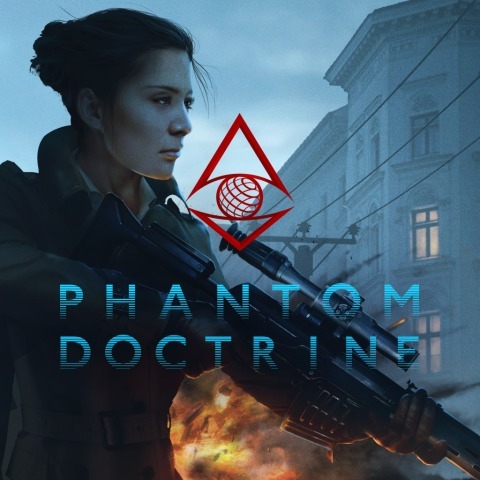
Now something I like to do often is think of the elevator pitch for a game, because it is a great jumping off point. Phantom Doctrine’s elevator pitch is simple, what if you had an X-com game that was about espionage and cool spy-shit. Agents would travel the world to take out threats, steal intel, and save the world. The game would be, like X-com, divided into the global overworld where you are at the command center ordering around agents, and then the other half of the game would be you running mission in a turn-based tactics game. For the most part Phantom Doctrine follows that elevator pitch, but it starts to sprinkle in more and more espionage that really starts to cloud the game.
Let’s start our conversation on the command center piece for now, and understand all that it might entail. Much like the elevator pitch, you run a squad of agents who are loyal to your cause and in the command center you can do what you might expect for some squad management. Here you can equip them with gear that you find on the battlefield, or purchase. When they get enough experience you can assign trainings or assign cool abilities. You can also fire them or hire new agents up to your agent cap. Now if you have no knowledge of Phantom Doctrine, you will soon learn that even the most basic of options are more complex then you would probably want. So, despite the easily understandable squad management stuff I touched on earlier, lets do a deeper dive. Your agents all start off with hidden abilities, that you could potentially unlock as they level up, or could be signs that they are traitors to the cause (more on that later), so when evaluating your agents you have to weigh that into their pros and cons. Agents can equip any weapon, but have proficiencies based on their training that make certain equipment better suited for them. If you micromanage your team you will have to weigh equipping the best weapon you have against equipping the best trained weapon you have to your agents. Only weapons that the agent has training in can be modified and attachments can be added to them. For instance if you want a silencer on a weapon (and you will want silencers on your weapons) you need to first be trained on the weapon. When assigning trainings to your agent (including weapon proficiencies) there are a limited number of slots that your agent can be trained, and while you can overwrite previous trainings (if you find you don’t use them), all training takes your agent out of commission for several days. So early on you might want to weigh trainings that can make you adept at using SMGs, or trainings that make your agent better at being stealthy. Keep in mind that any agent that you fire does not necessarily disappear, they could end up working for the agency trying to stop you, and thus cause problems later in life (again, we will talk about this later). Even hiring agents comes with an increase to your threat level, which lets talk about now, is the meta level that overarches the command center piece of the puzzle. Threat levels will slowly increase (or rapidly) as the agency trying to stop you gets closer to finding out where your secret base of operations is. By bringing in outsiders you might not be able to trust, firing agents, or letting the enemy get away with their missions all increase your threat level. You can only lower the threat level by moving your secret base, but that takes a substantial amount of money, and if the threat level peaks your base gets raided and some of your agents could die or be injured. Nearly everything you are doing, at least in the command center needs to be weighed against that threat level.
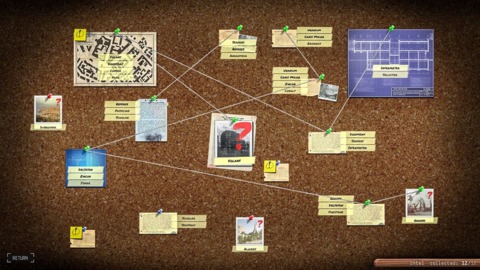
Ok, why don’t you go get a coffee, because we only talked about the basics of squad management and we got a lot left to dissect as things get wilder from here. Seriously, go get that coffee.. I’ll wait. I promise I won’t talk about anything important until you get back. Let me know when you are back…… Ok, so lets get back into it, and keep talking about your agents.. There are some more basics here, you have a hospital where if they get injured you can stuff them to start regaining their health, but as your agents go out on missions, if they get “spotted” they start to acquire heat. Now by “spotted” I really only mean if they enter a combat state in the level. If you do a level, without raising an alarm and just handle your business sneakily, then no heat. However, as agents gain heat they become more of a liability in missions. Their disguises will be less effective, enemies might know them on sight and if their heat is super high, civilians in levels might even alert guards when they are on a mission. Heat will slowly go back down as an agent chills in the hidden bunker and away from missions, or if you want it to be clear right away, you can grant your agent a new identity. This costs money, but you change the look, name, etc. of your agent which resets their heat. Later in the game you unlock a lab that can apply experimental drugs to raise your agent’s stats, which can make them run faster, shoot better, have more health etc. Of course because nothing is simple in this game, all of these have other nuances to them as well. Drugs you give your reps of course can sometimes lower stats, and some drugs won’t allow you to take others, so you could potentially be blocking your characters from using a better drug down the road, if you just inject them with everything that comes up first.
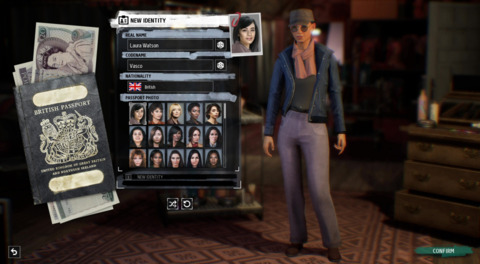
There are also jobs to be run in the command center that you can assign out to your agents. These jobs don’t prevent them from going on missions, but will prevent you from using them to set-up those missions. For instance you can assign agents to craft items (grenades, lockpicks, medkits) that they can then take into battle. You can assign agents to work as counterfeiters, where they will generate additional money for you to use. You can assign them to work a required mini-game for you, so you don’t have to (more on that later), or work in trying to overhear communications which grants you some confidential documents that help you in the mini-game.
Lets take a quick break here to talk about the “mini-game.” I am calling it a Mini-game when it is something that you will have to engage with if you want to actually beat the game, but all of the stolen documents you have and overhear from communications essentially get placed together and you have to tie a thread that connects them. Anyone who has seen a cork board with a red string that goes all over the place will understand the idea here. You read a transcript and pick out the important words that haven’t been redacted, and then you find other items that share those words and you can connect the two items. Do this enough times, and you can “solve” the task in front of you and this will unlock trainings, missions, new items to build, new dealers, etc. The mini-game might sound difficult, but you can solve these pretty blindly as the game tells you what the keywords are, and whether or not a thread connects the two documents, so its easy to brute force your way through. At first I was excited about this mini-game but its not too long in, that you realize they re-use sample writing and you are looking through the same communique over and over again. If you really hated this, you could assign one of your agents to connect the pieces, but I will say I found a better use of my agents since this is something you can do yourself.
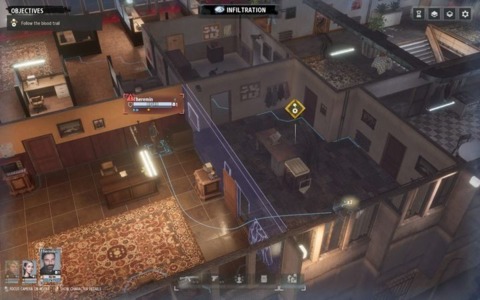
We have talked this long about the command center, and didn’t even really focus on the main-point of it existing. On the world map, as you progress time, little blips will show up in cities that you need to send your agents to investigate. These agents fly to the cities and a bar slowly fills up while they are investigating. Upon completion, you might come away with some new intel, it might be nothing at all, or it might lead to a mission that goes after your rival group. If you refuse to interact with a blip, it will eventually just disappear and you will either miss out on the intel, miss out on the red herring, or on the mission. 2 of those 3 is not much of a big deal, but missing out on the mission could cause a huge jump to your overall threat level meaning that the enemies are closing in. Flying to each location takes time, based on where your secret base is setup, and some of the blips are timed, because nothing in this game is simple. One strategy is to spread out your agents so that should a blip appear, you can just send the closest agent, and not lose any time in order to investigate, but obviously that can come with its own downfalls. For instance, if an agent’s heat or your base’s threat level is high, agents can be ambushed and you have to enter a mission where all the agents at a given location need to fight their way to the exit. An agent on their own, can mean that these ambushes mean a definitive loss of that agent, but you might not have enough agents to constantly buddy up together.
Congrats you found an enemy blip, and now there are a couple things you can do, based on how much time you have and whether or not you have upgraded your base (something I will skip talking about, but you can pay money to upgrade aspects of your base). You can try to tail an enemy agent back to their base, and while you give up the mission that is happening, you might be able to hit them in a more important attack. You can scout the area, which will grant your team some disguised characters for the actual mission (very helpful), or you can just launch a full-on counter mission, where you deploy agents to save the day.
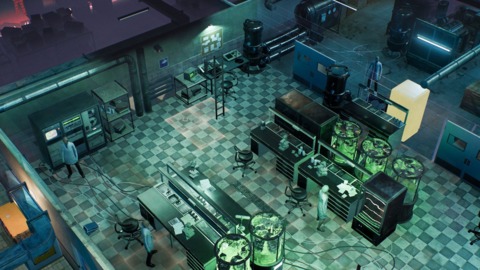
Now let’s finally talk about the other half of gameplay, the actual missions. In these missions you are usually given anywhere from 3-6 agents who are then tasked with stopping whatever the mission is at hand. These levels aren’t randomly generated, but are randomized in the sense that you don’t know which level you are going into, or where you are starting, but you will see levels repeat if you play the game to completion. For instance there is a library level, where there are two big buildings, a library and an apartment across the street, and your mission will almost certainly take you into the top floor of the apartment in the restricted area. I feel like I need to keep stopping to compose myself, because this game just requires so much explanation. In each level there are restricted points where you will be trespassing if you enter. Disguised agents can enter these areas and won’t arouse any suspicion, unless they are doing something suspicious, or if an enemy agent sees them. Ok, another quick break, so there are two types of enemies on nearly every map. There are just regular grunts, which will raise alarm if you if you are an un-disguised agent in a restricted area, and they spot you.. And then there are enemy agents. These are named agents, like Agent Sunflower, and they are practically bosses on a map. They have more health then the grunts, better guns, etc. And if they see your agents, disguised or not, will start combat. Depending on the mission type, you might be able to avoid these altogether, or you may be required to take them out.
Mission types might be to rescue someone and get them to an exit, might be to kill someone or all enemies and get to the exit, or might be to get a certain document and then get to the exit. Now nearly every mission can be completed without firing a shot, which is in your best interest if you can do it, for multiple reasons. For one, it means that you don’t risk injury or loss of an agent, your agent’s heat won’t go up, and your base’s threat level won’t go up. You accomplish this by going slow, knocking out enemies from behind, hiding bodies, and watching for vision cones so that you aren’t spotted in restricted areas. Might I also recommend save scumming, because when you get caught in this game, the whole map goes on red alert and every enemy knows where you are. Even an agent who was obeying the laws and was nowhere near the person who was caught in the red, they are immediately exposed and could come under fire. Two other things to take note of for stealthy missions. There are hidden intel items in every level, that if you can find will go towards that mini-game, I already explained, and again while not required can help speed up the main missions that require you to beat the puzzle included in that mini-game. The other issue, is that if you knock out too many guards, if there is an enemy agent on the map, they immediately get suspicious and start scouring the map for you, as well as to destroy any hidden intel they come across. While this can be frustrating because they might wander into your path, if you know that this exists it is an easy way to coax them out of a heavily guarded room. Knock out enough guards and they will leave that room on their own, and then you can take them out away from prying eyes. Another important tip, the only stat that matters in this game is HP. In order to knock out a guard, the agent you are controlling has to have more HP then whomever you are trying to knock out. So, whenever you can increase an Agent’s HP, you do it, because you don’t want to put in a situation where they can’t knock out a guard while sneaking, because their HP is too low.

Now, let’s say you don’t want to play that very boring stealth way, well there is gunplay in this game, but it does not operate like X-Com. Sure, there are full and half cover hiding points, and an overwatch button that you have to set, but shooting works differently. Every shot is a hit assuming you are within range to target an enemy (or they target you). The difference is that depending on a lot of factors, there is a low damage threshold and a high damage threshold, on screen. For instance, shooting from distance against an enemy in full cover, means you might only do 1-3 damage as that was your low damage threshold, while flanking them and shooting might net you 60+ damage. Since most enemies have between 30-70hp and enemy agents are usually over 100, doing 1-3 damage is basically a waste of a turn, but you don’t actually know what the outcome is going to be until you fire the shot. There is no dice rolling, no % to hit, or anything you might expect to help you make educated decisions on when to fire a shot. Obviously something is happening behind the scenes, and it is possible that you can still do some real damage firing at someone in full cover, but it just not be in your favor very often. Another reason, why it behooves you to just play it stealthy, because you never miss when knocking out guards as long as you have more HP then them, and it fells them in one hit for the entire map. Again because, this game can’t just be simply designed. Enemy agents who aren’t killed or knocked out in a level, will get stronger and can appear in a different level later, so while it can be risky.. it is almost always better to kill enemy agents when given the chance, I would just recommend doing it as a knockout, instead of starting a fire-fight.
There is more here, silent weapons won’t raise alarms, assuming you kill the target in one shot. You can do breach and clear with multiple agents posted up on a doorway, but if any of your agents has a loud weapon (anything without a silencer) while it might clear a room, it will also make every enemy left on the map aware of your presence. There are also cameras that can be taken down via terminals on nearly every map, as being seen by a camera, is essentially the same as being spotted by a guard in a restricted area. If you took the time to pre-plan and unlock disguises for said mission, your disguised agents will usually already start in enemy territory and can act as your eyes for the whole mission, as they can go almost anywhere without getting in trouble. I have beaten numerous missions where I only used the disguised agents to steal or take down whomever I needed, and never moved my other agents.
When the mission is concluded, agents will gain XP and fly back to your base where you can then upgrade them or train them if need be, and then you get to do everything all over again. Main missions act the same way as side missions, with unique requirements for passing and making you’re your designated main character is in the mix. Overall though, outside of a few levels, you won’t be able to tell what is a main mission compared to a side mission.
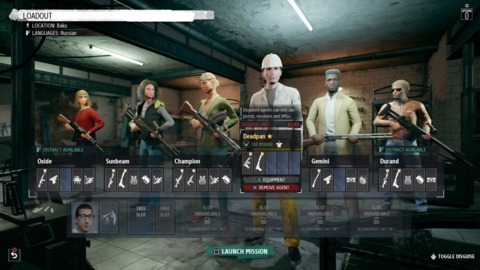
I haven’t gotten into my gripes or praises of the game yet (really), all the above is just flat out descriptions as to how many systems are at work in this game, and while it can seem impressive that everything you do works on multiple different levels, it also can be immensely frustrating, when you have to juggle all of these things to be successful. When developing the game, they thought of all these cool ideas; disguises, heat, enemy agents, redacted intel, etc., etc., but they didn’t really judge IF all these things should be combined. In fact I found the most success when I tried to avoid as many of these systems as possible. All my reps were trained on roughly the same weapons, all equipped with silencers and then I never switched up their equipment. I had the same reps, outside of hiring 2 reps early in the game, throughout the whole game. I never captured enemy agents (something I didn’t mention you could do), never interacted with the brainwash room (yup this exists too) outside of the main story that requires it. I tried to do every mission stealthy, even if it meant save scumming, because the implications otherwise were too much work.
The game wants to be the ultimate spy thriller, but it just becomes a convoluted mess. I haven’t addressed the story, but think alternative Cold War tale where someone wants to destroy the other side. There are numerous double crosses, red herrings, people who aren’t who they say they are, etc. All the tropes you would expect from a spy movie, the problem is two-fold. The story gets so diluted that I couldn’t even track what was happening on a point by point basis, so any cool revelations or triumphant feelings go over my head because I don’t actually understand the gravity of any situation. This might be intentional, because beating the game unlocks a chance to play through the game again with more story being fed to you. Something that would normally be intriguing to me, if one playthrough didn’t take me 40 freaking hours to beat. According to howlongtobeat.com, a completionist playthrough of this game is 120 hours, playing both campaigns (you pick CIA or USSR to start the game) and then playing through the final story, which is the extended cut. I can’t imagine the person who plays through that 120 hours and feels good about their life. That’s not to say the game is exceptionally bad, but you have seen everything at 20 hours that this game has to offer, to play through another 100 would be awful.
Which is really my biggest complaint with the game. The length is atrocious and it seems at every moment the game stretches it behind comparison. In between just the balance of doing main missions and side missions to prevent your threat level from reaching catastrophic sizes, there are a lot of main missions that have to be researched first before you can tackle them. The later in the game you go, the more intel is required to research these, and if you are only getting 3-4 pieces per side mission, and you need to get 20 total pieces, you are sitting and playing the same levels over and over again just to collect intel, for the chance at playing a different level as a main mission. That example doesn’t just happen once, there are multiple points in the story, where you just have to wait to unlock the next main mission, and unless you are just willing to eat the hits the game gives you for not engaging in side missions or flushing out enemies, then you are kinda left playing side missions until you get to the next progress point. All of this could be mitigated if combat was more fun, but it is in your best interest to not actually engage in combat, so you are constantly at the push pull of what is best for me the player and what is best for my game.

I know sometimes I discredit a game, because of how I played it, and this could fall into that instance. However, I can’t imagine a cavalier player who is engaging in combat in every mission, churning through agents and spending a lot of money that you don’t have to remove the heat off of all their agents over and over again. I was maybe at the extreme end of the stealth spectrum, but I was still pretty broke at spots in the game, because I was upgrading my base, agents, and the like… can’t imagine if I was removing heat after every two missions.
This game wasn’t even bad, it doesn’t crack my bottom tier, and there is nothing broken about the game. It just gets tedious fast and it was in desperate need of an editor. The creators shouted out every cool spy thing they could think of and incorporated it into the game, but they never stopped and thought if it should have been there, or if it made other elements stronger or weaker. For instance removing the aspect of heat, could have made combat more exciting instead of damning, because the ramifications for getting in a fire-fight would be boiled down to just how injured someone gets, assuming they win the fight. Editing out the redacted paperwork mini-game, could have streamlined research. Etc. I liked the first 10-20 hours of the game, even if I lost the thread of the story early on, because I was enjoying the espionage aspect of the game and trying to be stealthy, but the longer I played I saw all the gears running, and the game wasn’t as interesting as I was led to believe. At 15 hours, I would have gladly started this game again to see the more explained story, or even tried playing as the other starting point. I might have still regretted past hour 20, but I would have at least been more excited to start it over then I do now.
All of my praises start with the phrase “at first,” which is probably a problem. At first I liked the minigame because It was fun to connect the dots like a puzzle, but ended up disliking it when I was required to solve them in late games and gather paperwork just to advance the story. At first I liked being stealthy and trying to get through missions without firing a shot, because at times you feel super smart and like a great agent, but by the 8th time through the same map, it becomes incredibly boring. At first I liked all the command center options, because it made me feel like there was a lot to do for each agent to personalize them, then I realized only HP mattered, and it was best that they had a silenced weapon above all other weapons. At first the story seemed intriguing, but the main missions get doled out so slowly that it can be hard to remember what happened 10 missions ago. All of those positives come loaded with negatives, which doesn’t bode well for the game’s rating, and it does leave a bad taste in my mouth when I finished the game.
In reality, despite thinking it was a decent game (not great, not terrible), I can’t recommend this to a lot of people. Do you like X-com, but not any of the exciting bits? Do you like stealth games, but want them to be turn-based? Do you Spy stuff, like the administration aspect of spies, and not really the cool stuff spies do? Instead I would just be asking, do you like ambitious games that perhaps don’t ask if they should do something, only if they could do something? Then maybe this game is for you.
Is this the greatest game of all time?: No
Where does it rank: It is the 86th greatest game out of 131. It's not that it's necessarily bad, but it is bloated and not all the systems play well together. I like Spy Thrillers, and I like X-Com games, so this should be a homerun, but it overstays its welcome. I like being able to potentially mix stealth or action into my turn based strategy, but clearly one options far outweighs the other, and once you realize that, you also realize you have a boring 20 hours of trying not to fire a shot. It sits between "Hand of Fate" (85th) and "Mutant Football League" (87th).
Anyone looking for it: here is the link to the list and more if you are interested in following along with me (this is not a self promotion).Here. I added links on the spreadsheet for quick navigation. Now if you missed a blog of a game you want to read about, you can get to it quickly, rather than having to scroll through my previous blogs wondering when it came up.
Thanks for listening
